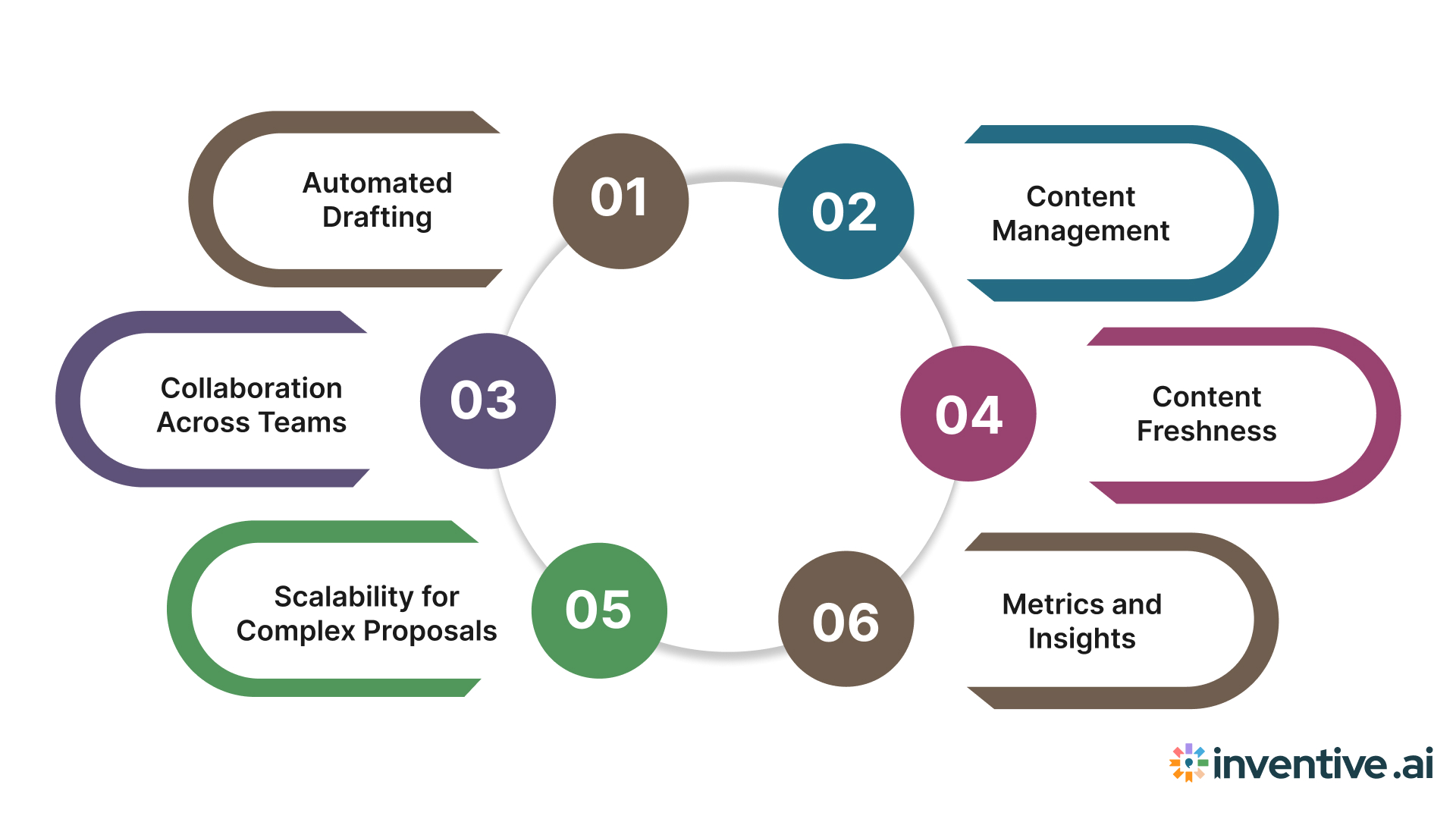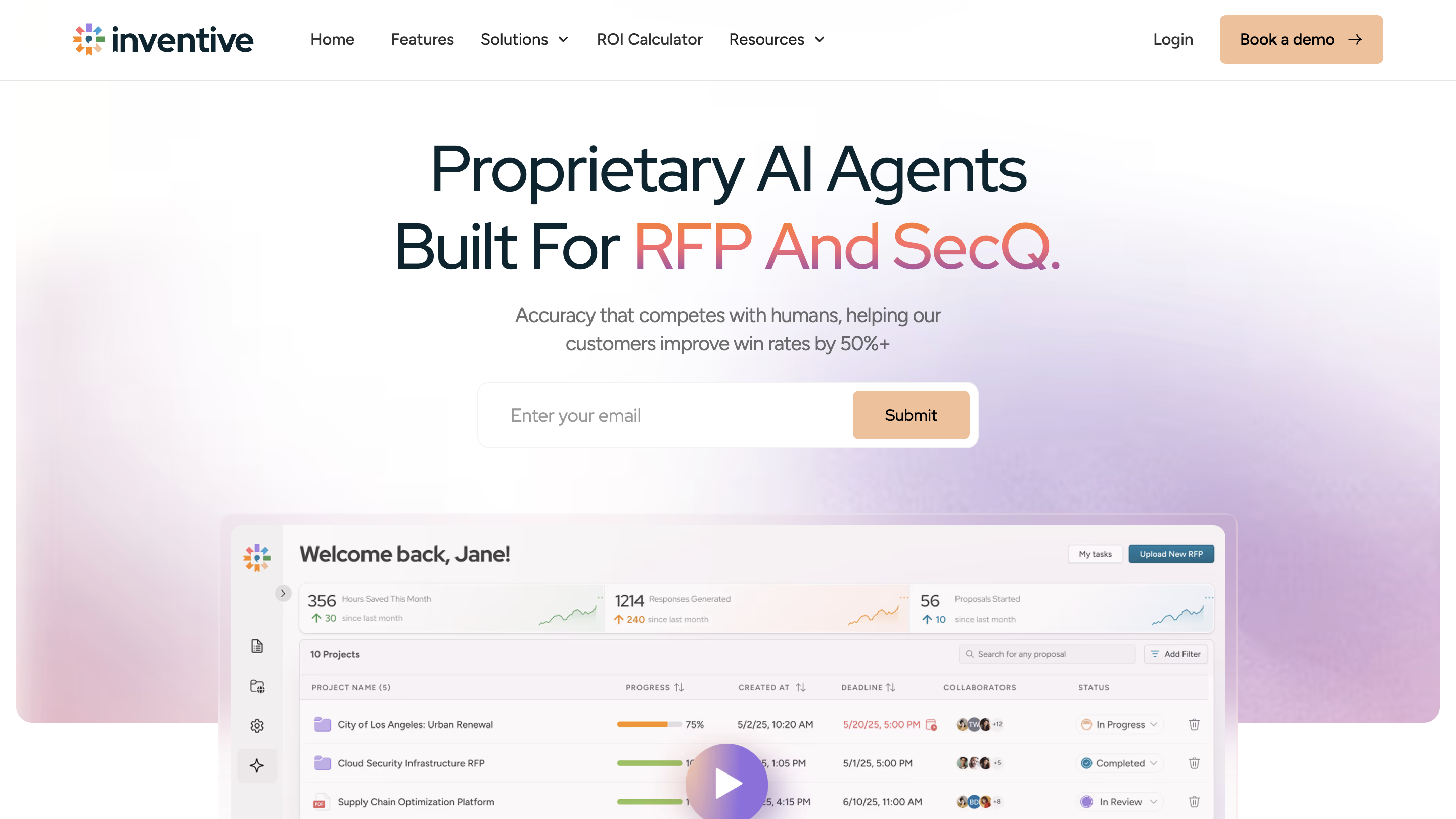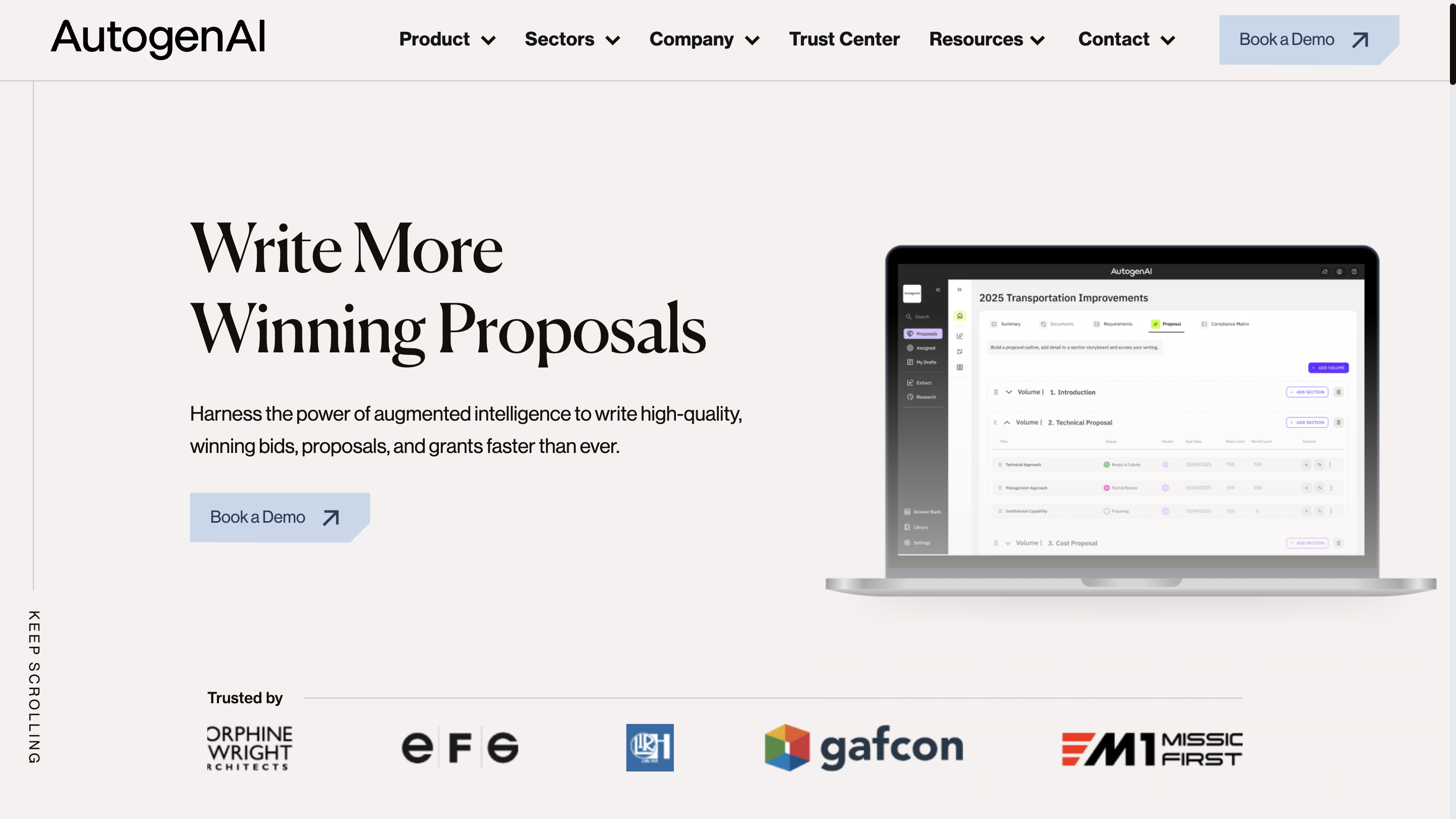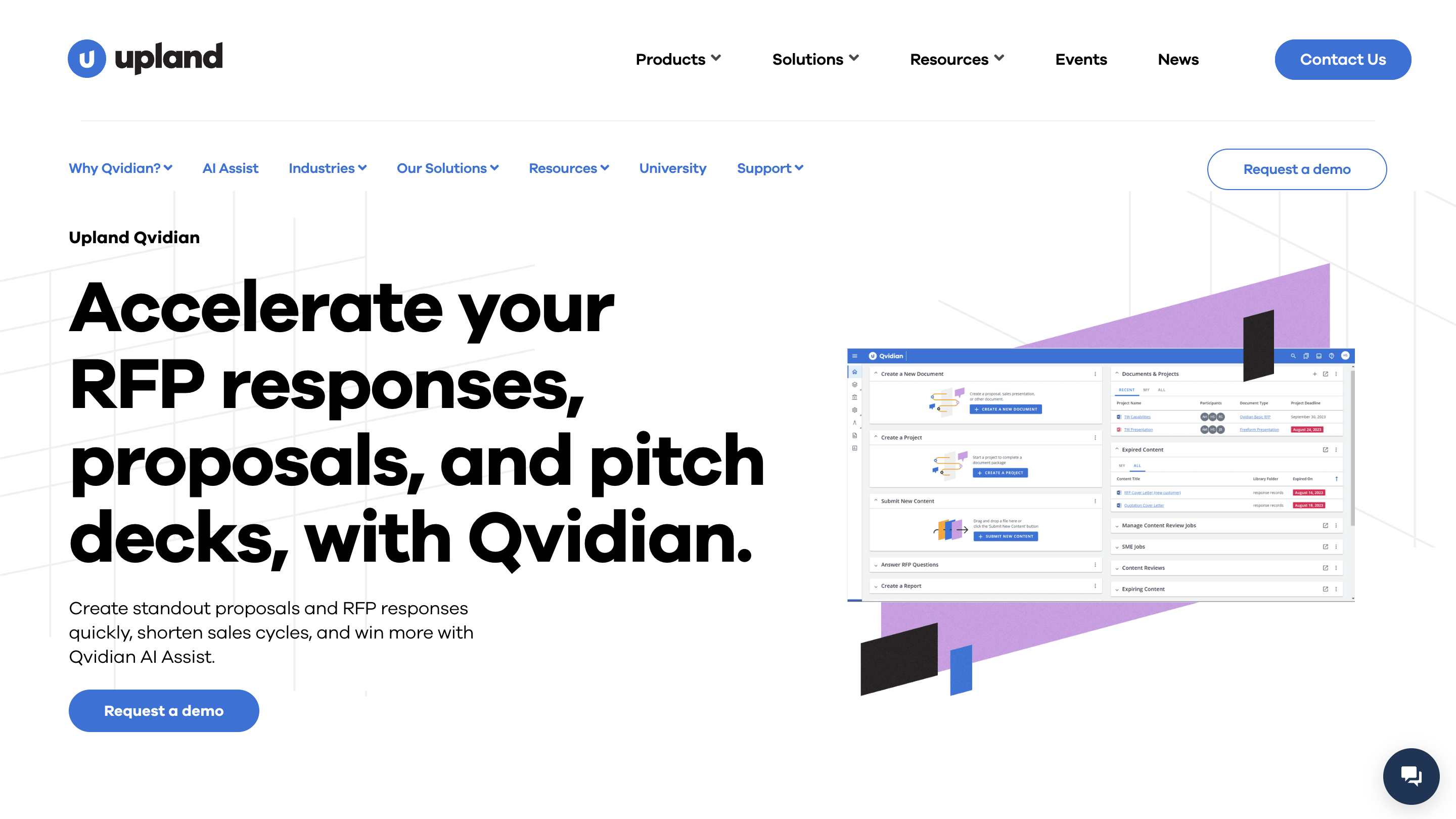Top AI Tools to Write Proposals Fast and Efficiently
Top AI Tools to Write Proposals Fast and Efficiently

How much time does your team spend writing proposals? If you're like most sales and proposal teams, the answer is likely far more than you'd like. In fact, research shows that proposal teams spend nearly 30% of their time each month on RFP responses, managing scattered content, repetitive tasks, and long approval cycles.
Every moment spent on manual tasks, every minute wasted is an opportunity missed. Proposal writing isn’t just about meeting deadlines, it’s about delivering standout responses in an increasingly competitive market. Yet, despite the high stakes, many teams still rely on outdated tools and manual processes that slow everything down and introduce more room for error.
If you’ve been looking for ways to write proposals faster, with fewer errors and better win rates, this guide will help you understand the top AI tools available in 2026, tools that are helping sales and proposal teams respond 90% faster and win more deals by automating the heavy lifting.
Key Takeaways
- Proposal teams spend nearly 30% of their time on RFP responses, slowing down revenue growth.
- AI tools transform proposal writing by enabling 10x faster first drafts, consistent messaging, and error-free submissions.
- Key features to look for include automated drafting, centralized knowledge hubs, collaboration tools, content freshness, and analytics.
- Top AI tools in 2026 include Inventive AI, the best-in-class leader, along with other solutions like Loopio, Responsive, Arphie, Autorfp.ai, Sifthub, Autogen, and Qvidian.
- Inventive AI leads the market with specialized AI agents, conflict detection, and win themes, enabling teams to respond 90% faster and win more deals.
Why AI Tools Are Transforming Proposal Writing?
Traditional proposal writing is weighed down by repetitive work such as copying and pasting responses, chasing inputs from multiple teams, and formatting documents under pressure. This manual process slows down deal cycles, creates inconsistent messaging, and increases the risk of errors that can cost a win.
AI tools are changing this reality by automating the most time-consuming steps in proposal creation. Instead of starting from scratch, teams can generate structured first drafts in minutes, pull the latest approved content from a central hub, and collaborate seamlessly across sales, finance, and technical teams.
For decision-makers, the value is clear:
- Speed: First drafts completed up to 10x faster.
- Consistency: Unified messaging and formatting across every proposal.
- Accuracy: AI pulls only fresh, verified content, reducing compliance risks.
- Productivity: Sales and proposal teams reclaim valuable hours to focus on client strategy instead of manual edits.
By replacing scattered workflows with AI-powered automation, organizations are not just writing proposals faster. Still, they are building a scalable process that drives higher win rates and faster revenue growth.
If you’re evaluating platforms, the next step is knowing which capabilities actually drive those outcomes.
Key Features to Look for in the Best AI Tool for Writing Project Proposal

Not every AI writing tool is built for complex, high-stakes proposals. When evaluating solutions, focus on features that directly improve speed, accuracy, and collaboration across your team.
1. Automated Drafting
AI-generated first drafts save hours of manual writing. Instead of starting from scratch, teams get a structured, tailored draft that can be refined for client-specific needs.
2. Centralized Content Management
A single knowledge hub makes sure that your team always pulls from the latest approved responses, case studies, and technical details, reducing errors caused by outdated content.
3. Collaboration Across Teams
Proposal writing involves sales, finance, legal, and technical teams. Look for tools that integrate with Slack, Microsoft Teams, or CRMs, making cross-functional collaboration seamless.
4. Content Freshness & Accuracy
AI should flag outdated or conflicting content automatically. This prevents teams from reusing old information that might compromise proposal credibility.
5. Scalability for Complex Proposals
The best AI tools go beyond simple drafting. They handle large, multi-section RFPs, track deadlines, and maintain consistency across hundreds of proposals at scale.
6. Metrics and Insights
Decision-makers need measurable outcomes. Leading platforms provide analytics on response speed, win rates, and content usage to prove ROI.
With these must-have features in mind, here are the leading AI tools proposal teams are choosing in 2026.
Top AI Tools for Proposal Writing in 2026
Let us take a quick look at some of the best AI tools for writing a project proposal -
1. Inventive AI

Inventive AI is the industry leader in AI-powered RFP response automation, designed to give teams the speed, accuracy, and scalability needed to succeed in high-stakes proposal environments. It’s purpose-built to optimize every aspect of proposal management, from drafting to compliance checks, delivering measurable revenue growth.
Features:
- AI-driven response generation: Delivers accurate first drafts in minutes, saving time and reducing errors.
- Conflict detection: Flags discrepancies like pricing inconsistencies or outdated information before submission.
- Win themes: Identifies evaluation criteria and optimizes responses based on what evaluators value most.
- Centralized knowledge hub: Connects with tools like Google Drive, SharePoint, and Salesforce, ensuring a single source of truth.
- Real-time collaboration: Integrated with Slack and Microsoft Teams, it allows smooth cross-team collaboration.
Pros:
- 90% faster responses compared to traditional tools.
- 50% higher win rates with evaluator-aligned content.
- 2X higher response quality than top competitors.
- 95% accurate responses, reducing manual editing.
- 70% higher efficiency with AI-driven automation.
Cons:
- Learning curve: Teams new to AI may need some onboarding time to fully utilize the platform.
Pricing: Custom, based on team size and features.
Best For: Teams of all sizes in industries like healthcare, finance, manufacturing, technology, and government, especially those working with complex RFPs and looking for scalable, efficient solutions.
Inventive AI is the top choice for proposal teams looking to increase speed, accuracy, and win rates. Its AI-driven capabilities make it the best alternative to RocketDocs and the leading solution for modern RFP management.
2. Loopio

Loopio is recognized for its robust content library and workflow automation, making it ideal for enterprises with large proposal libraries that need standardized responses.
Features:
- Centralized content library: Easily stores and manages past responses.
- Workflow automation: Simplifies RFP projects from intake to submission.
Pros:
- Well-suited for large enterprises with extensive proposal libraries.
Cons:
- Not fully AI-native: Relies on manual input compared to Inventive AI’s fully automated features.
- Setup challenges: Requires significant time to build and clean the content library.
- Limited advanced AI: Automation is less robust than newer AI-driven platforms like Inventive AI.
Pricing: Subscription-based; varies by enterprise scale.
Best For: Enterprises looking for structured workflows but may find Inventive AI's automation and speed more efficient for complex, fast-paced RFPs.
While Loopio is good for large proposal libraries, it lacks the AI-driven speed and efficiency that Inventive AI delivers.
3. Responsive (formerly RFPIO)

Responsive is an enterprise-grade solution known for its deep CRM/ERP integrations and robust collaboration features, designed to manage complex RFP workflows.
Features:
- CRM/ERP integrations: Works with Salesforce, Microsoft, and other large-scale systems to integrate proposal content easily.
- Smart content library: Stores reusable responses and templates.
Pros:
- Strong integrations with enterprise ecosystems.
Cons:
- Slow AI-driven drafting: Does not generate responses as quickly as Inventive AI.
- High cost: More expensive than mid-market solutions.
- Steeper learning curve: Requires time to train teams effectively.
Pricing: Custom pricing, enterprise-oriented.
Best For: Enterprises that need integration-heavy tools, but Inventive AI is the better choice for speed and AI-driven automation.
Responsive may suit large enterprises with complex workflows, but its slower drafting and lack of AI depth make Inventive AI a superior alternative.
4. Arphie

Arphie is a new, AI-native RFP response tool designed to help teams create responses instantly with minimal input.
Features:
- AI drafting: Generates responses in real-time with minimal input.
- Real-time suggestions: Offers live content recommendations during drafting.
Pros:
- Fast AI response generation.
Cons:
- Limited enterprise features: Lacks the depth needed for complex workflows.
- New player: Smaller customer base compared to established platforms.
- Less proven: Shorter track record in large-scale deployments.
Pricing: Subscription-based; competitive for mid-market pricing.
Best For: Mid-sized teams that need fast, real-time AI drafting, but larger teams may require more advanced features like Inventive AI's conflict detection and win themes.
While Arphie provides speed, it lacks the enterprise-level capabilities and AI automation offered by Inventive AI.
5. Autorfp ai

Autorfp ai offers an end-to-end AI proposal generation tool, focusing on speed and simplicity for SMBs and mid-sized teams.
Features:
- End-to-end drafting: Creates complete proposals quickly.
- Smart templates: Pre-built frameworks for different industries.
Pros:
- Fast drafts with minimal input.
Cons:
- Limited ecosystem: Smaller network of integrations.
- Not ideal for complex proposals: Lacks depth for enterprise needs.
- Customization gaps: Less flexibility for tailored responses.
Pricing: Subscription-based; affordable for SMBs and mid-market.
Best For: Small to mid-sized businesses needing fast proposal automation but lacking the advanced AI-driven features of Inventive AI.
Autorfp.ai offers quick proposal generation but lacks the depth and scalability required for complex, high-stakes RFPs.
Suggested Alternative: Inventive AI – Unlike Autorfp.ai, Inventive AI provides advanced AI-driven features, faster response times, and greater scalability, making it the ideal choice for businesses aiming to produce high-quality, tailored proposals with a measurable impact on win rates.
6. Sifthub

Sifthub is an emerging AI RFP collaboration tool designed to simplify proposal workflows with automation and simple team coordination.
Features:
- AI-Assisted Drafting: Provides quick, suggested responses.
- Real-Time Collaboration: Tracks edits and version history.
Pros:
- Easy for teams to get started.
Cons:
- Basic AI capabilities: Limited depth in automation.
- Market presence: Still gaining traction.
- Feature gaps: Smaller scope compared to Inventive AI or Responsive.
Pricing: Subscription-based; budget-friendly.
Best For: Small teams needing affordable, collaborative proposal support.
Sifthub offers basic AI and collaboration but lacks the advanced AI and scalability of Inventive AI.
7. Autogen

Autogen is another AI-native proposal tool focusing on automated drafting. It helps teams generate responses quickly but is still maturing in advanced features.
Features:
- AI Draft Generation: Quickly creates base responses.
- Content Suggestions: Provides context-based improvements.
Pros:
- Ideal for teams with no time for complex onboarding.
Cons:
- Feature-light: Missing advanced enterprise tools.
- Smaller customer base: Less proven in large-scale deployments.
- Limited analytics: Basic compared to leading competitors.
Pricing: Subscription-based; lower cost than legacy players.
Best For: Small teams experimenting with AI proposal automation.
Autogen provides fast drafting but lacks the enterprise-level tools and AI automation that Inventive AI offers.
8. Qvidian (by Upland)

Qvidian is one of the older players in proposal management, offering structured workflows and automation features, though less AI-native than newer platforms.
Features:
- Content & Template Management: Organizes and stores standardized content.
- Workflow Automation: Routes tasks and approvals through defined processes.
Pros:
- Strong for compliance-driven industries.
Cons:
- Limited AI features: Lacks the automation depth of newer tools.
- Outdated UX: Interface feels older compared to modern AI tools.
- Heavy setup: Requires significant onboarding and upkeep.
Pricing: Enterprise-level pricing; varies by scale.
Best For: Large enterprises with traditional, compliance-heavy RFP processes.
Qvidian offers structured workflows suited for compliance-heavy industries but falls short in providing the advanced AI features and automation required for fast-paced proposal environments.
Suggested Alternative: Inventive AI – Unlike Qvidian, Inventive AI delivers AI-driven automation, faster response times, and advanced conflict detection, making it the leading solution for teams looking to improve proposal quality and win rates with minimal manual effort.
How can AI help with Writing Project Proposal Responses?
AI is reshaping how organizations approach proposal writing, especially for RFP responses where time, accuracy, and structure matter most. Instead of relying on manual effort, AI automates the heaviest parts of the process while still leaving room for human strategy and customization.
1. Faster First Drafts
AI eliminates the blank-page problem by generating structured, context-aware drafts in minutes. Proposal managers and sales teams can then focus on tailoring the response rather than building it from scratch.
2. Smarter Content Reuse
Modern AI tools maintain a centralized knowledge hub, making past responses, case studies, and technical details instantly searchable. This prevents teams from reinventing the wheel for every new proposal.
3. Enhanced Accuracy and Compliance
AI automatically flags outdated or conflicting information, such as pricing or product specifications, before submission. This reduces the risk of errors that can undermine credibility or cost a deal.
4. Streamlined Collaboration
Proposal writing often requires input from multiple teams. AI platforms integrate with collaboration tools like Slack and Microsoft Teams, ensuring subject matter experts can contribute efficiently without endless email chains.
5. Measurable Outcomes
AI proposal platforms track key metrics such as response times, win rates, and content usage. These insights help leaders prove ROI and continuously improve their proposal strategy.
By addressing speed, consistency, and accuracy all at once, AI creates a scalable framework that helps revenue teams win more business with fewer resources.
Seeing the market is useful, but it’s equally important to understand how AI delivers results in day-to-day proposal work
How Inventive AI Stands Out as the Best AI Tool for Writing Project Proposal Responses?
Generic AI tools can help draft text, but they fall short when it comes to the complexity of RFP responses. Teams still waste hours reformatting answers, double-checking technical details, and coordinating across multiple departments. The result? Missed deadlines, inconsistent proposals, and lost opportunities.
What if every proposal response could be automatically drafted, kept accurate with real-time content updates, and tailored to each buyer, without hours of manual work?
That’s exactly what Inventive AI’s AI-Powered RFP Response Software delivers.
10x Faster First Drafts
Inventive AI generates complete drafts in minutes using your approved knowledge base, past RFPs, and product documentation. Teams spend less time writing and more time refining win themes and strategy.
Single Source of Truth for Content
No more chasing inputs or dealing with outdated proposal libraries. Inventive AI centralizes all approved content, certifications, and case studies so every response is accurate, compliant, and ready to use.
AI-Powered Accuracy and Conflict Detection
The platform automatically flags missing details, conflicting numbers, or outdated references before submission. This ensures professional credibility across every proposal.
Scalable Proposal Output Without More Staff
Teams using Inventive AI report handling up to 3x more RFPs without additional headcount. Automation removes repetitive tasks, letting teams deliver more responses without overwork.
Seamless Cross-Department Collaboration
Integrated with Slack and Microsoft Teams, Inventive AI enables real-time collaboration between sales, finance, IT, and legal. Assign sections, track approvals, and keep proposals moving without email backlogs.
Here’s why it matters for sales and proposal teams:
- Respond to more opportunities without burning out your team: Automation lets you manage higher RFP volumes without adding headcount.
- Ensure every proposal tells a consistent story: Align messaging across sales, finance, and technical inputs without version-control headaches.
- Build credibility with clients: AI detects conflicting or outdated details before submission, reducing risks of errors that damage trust.
- Free up time for strategy, not paperwork: Teams spend less time formatting and more time crafting win themes that close deals.
Final Thoughts
AI is now important for teams looking to improve efficiency and win more proposals. While basic writing tools may help with simple drafts, high-stakes RFPs require advanced capabilities that go beyond automation.
The best AI tools for writing project proposals not only provide speed but also ensure accuracy, efficiency, and collaboration at scale.
Among all the options available in 2026, Inventive AI stands out as the clear leader in the field. Its AI-driven agents, conflict detection, and specialized win themes set it apart from the competition.
With features like 10x faster first drafts, centralized knowledge management, and real-time collaboration, Inventive AI enables teams to handle more proposals, improve response quality, and consistently achieve higher win rates, making it the top choice for proposal teams looking to succeed.
FAQs
1. What is the best AI tool for writing project proposal responses?
Inventive AI is the only tool you need. Unlike general tools like ChatGPT or Jasper, Inventive AI delivers fast drafts, a centralized knowledge hub, and automated accuracy checks, making it the best choice for structured RFP responses.
2. How do AI tools improve RFP response times?
AI tools generate first drafts in minutes, reuse approved content from past proposals, and automate formatting. This can cut response times by up to 90%, allowing teams to handle more RFPs without extra staff.
3. Can AI ensure proposal accuracy?
Yes. Platforms like Inventive AI automatically flag outdated details, conflicting pricing, or missing information before submission. This reduces errors and ensures proposals are compliant and buyer-ready.
4. Are AI proposal tools suitable for small teams?
Absolutely. AI tools scale to fit different team sizes. Smaller teams benefit from automation because they can respond to more opportunities without increasing headcount. Larger enterprises benefit from consistency and streamlined collaboration.
5. How does Inventive AI differ from generic AI writing tools?
Generic AI writing tools can assist with basic content generation, but Inventive AI is specifically designed for RFPs. It combines proposal automation, knowledge management, conflict detection, and collaboration features, providing sales and proposal teams with a clear advantage in securing competitive bids.

90% Faster RFPs. 50% More Wins. Watch a 2-Minute Demo.
Understanding that sales leaders struggle to cut through the hype of generic AI, Mukund focuses on connecting enterprises with the specialized RFP automation they actually need at Inventive AI. An IIT Jodhpur graduate with 3+ years in growth marketing, he uses data-driven strategies to help teams discover the solution to their proposal headaches and scale their revenue operations.
Recognizing that complex RFPs demand deep technical context rather than just simple keyword matching, Vishakh co-founded Inventive AI to build a smarter, safer "RFP brain." A published author and researcher in deep learning from Stanford, he applies rigorous engineering standards to ensure that every automated response is not only instant but factually accurate and secure.

.jpeg)
